5 films and TV shows to watch this weekend, according to Times experts
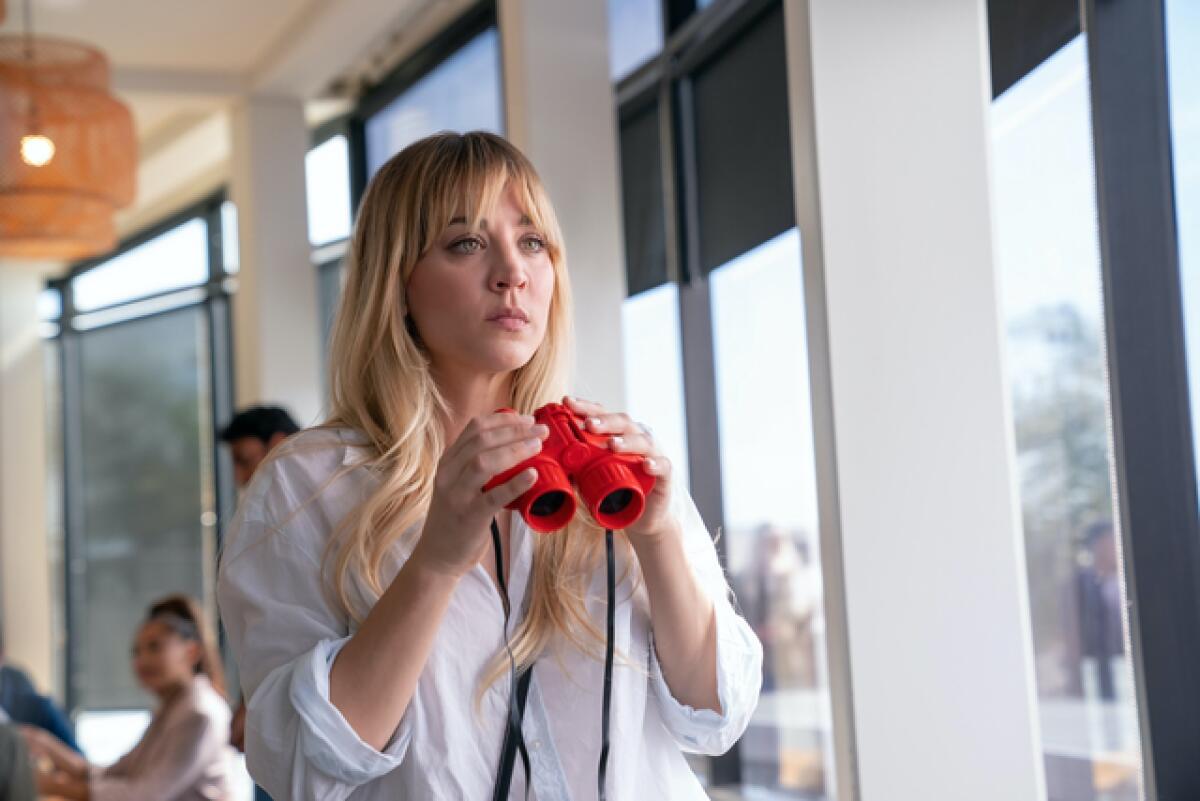
- Share via
Welcome to Screen Gab, the newsletter for everyone who knows “The Best Things in Life Are Free” — especially when Robert Morse is singing it.
The two-time Tony winner (for “How to Succeed in Business Without Really Trying” and “Tru”), who died Wednesday at 90, might have made his name on the Broadway stage, but to TV buffs he’ll always be remembered for his role as “Mad Men’s” Bert Cooper, the eccentric advertising agency executive who shuffled off this mortal coil with an unforgettable soft-shoe to the 1927 standard.
“It was a love letter. It was a package of dreams,” the actor told The Times’ Meredith Blake of Bert’s farewell in 2014. “It was Christmas and my birthday.”
In this week’s edition, you’ll find another farewell — to Pamela Adlon’s “Better Things” — plus a pair of Paris-set recommendations and a guest appearance by “The Flight Attendant” co-showrunner Steve Yockey, who tees up the HBO Max series’ highly anticipated second season.
Want to be featured in Screen Gab? Please send your TV or streaming movie recommendation to screengab@latimes.com with your name and location. Submissions should be no longer than 200 words and are subject to editing for length and clarity.
The complete guide to home viewing
Get Screen Gab for everything about the TV shows and streaming movies everyone’s talking about.
You may occasionally receive promotional content from the Los Angeles Times.
ICYMI
Must-read stories you might have missed
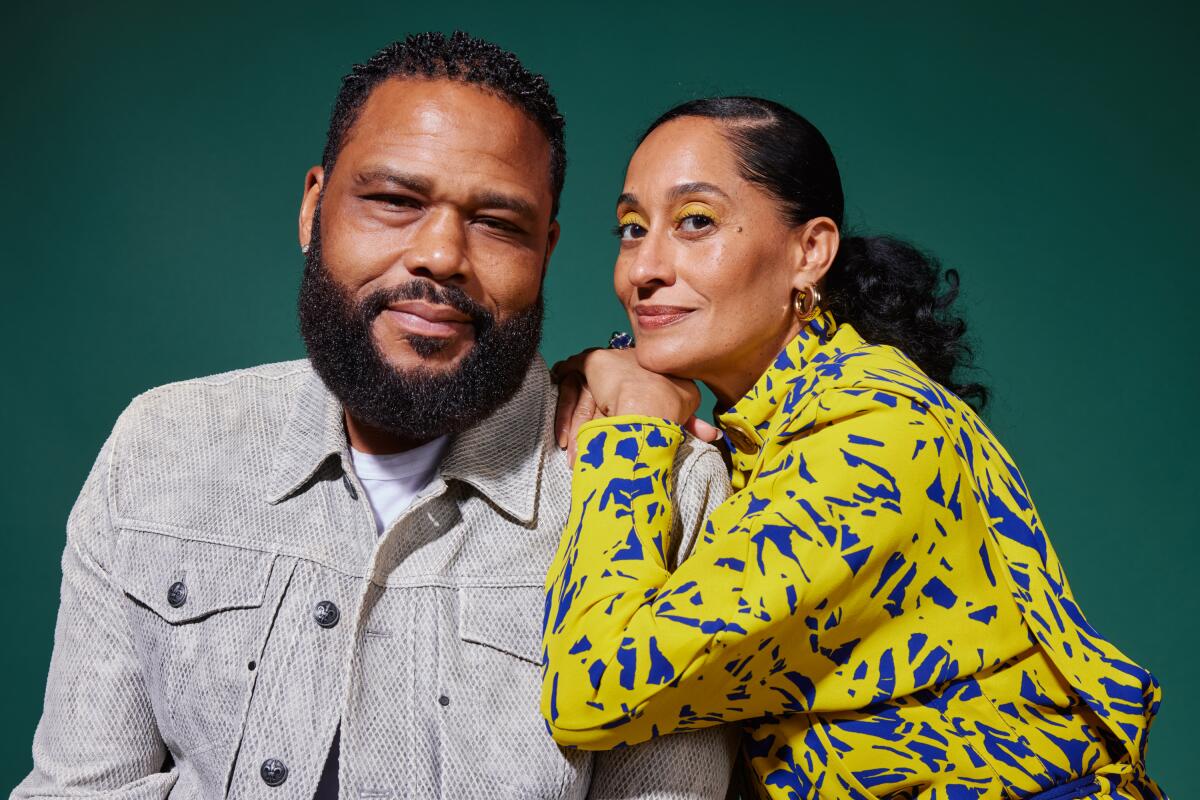
‘black-ish’ transformed television. Especially when it ‘ran into trouble’: After eight seasons of thorny issues, heated debates and one shelved episode, Kenya Barris, Anthony Anderson and Tracee Ellis Ross say goodbye.
Why the ‘weird puzzle’ of Apple’s new anthology took up to 40 rewrites to get right: “GLOW” alumnae Carly Mensch and Liz Flahive talk assembling female talent, giving Melania Trump the ax and more about “Roar” on Apple TV+.
Jerry West demands retraction of his ‘cruel’ portrayal in ‘Winning Time’: Laker greats Jerry West and Kareem Abdul-Jabbar are angered by their depictions in HBO’s saga of the Showtime-era Lakers.
With ‘Russian Doll,’ Natasha Lyonne wants to ‘catalog a life.’ Just not her life: The star of Netflix’s dark comedy steps into the showrunner role in Season 2 — and rethinks how place, time and family history can help tell a person’s story.
Turn on
Streaming recommendations from the film and TV experts at The Times

Fanny Herrero, who created the series known here as “Call My Agent” — “Dix pour cent” in the French original — turns her attention to another quarter of the business of show in the terrifically sweet “Standing Up,” currently streaming on Netflix. The episodic nature of “Agent,” in which famous actors play versions of themselves, is jettisoned in favor of a purely serial story set in the comedy clubs of Paris as the richer sectors of the city give way to less chic neighborhoods, with a cast that trends young. The central characters, most of them people of color, include Bling (Jean Siuen), whom quick success derailed, but not before he opened the club that gives the series its main setting and original French title, “Drôle”; Aïssatou (Mariama Gueye), a coming star, managing or not managing a family; shy Nezir (Younes Boucif), who has a gift for analysis; and Apolline (Elsa Guedj), an upper-crust girl trying to get started in the scene. (Real French comics — stand-uppeur and stand-uppeuse are the terms of art — who will not be at all recognizable to American audiences, get a little stage time.) If the storylines mine backstage dramas from “A Star Is Born” on, “Standing Up” catches, better than any series I’ve seen, the bond between an audience and the person making them laugh. —Robert Lloyd
Available now on VOD and in theaters, “Paris, 13th District” is a portrait of contemporary life from French filmmaker Jacques Audiard told with charming warmth and a sense of intimacy and immediacy. The story captures a roundelay of personalities as they slip in and out of each other’s lives. Emilie (Lucie Zhang, in a marvelous feature debut) lives in her grandmother’s old apartment and begins an affair with Camille (Makita Samba) after he rents her spare room. He also starts seeing Nora (Noémie Merlant), who just moved to the city and has begun working in the same real estate office. Plus, Nora becomes increasingly obsessed with online porn star Amber Sweet (musician Jehnny Beth) after being mistaken for her at a party. Adapted from a series of stories by American graphic novelist Adrian Tomine by Audiard, Léa Mysius and Céline Sciamma, the film feels like a confluence of sensibilities brought together by its observant black-and-white photography and a sexual candor that feels more honest than explicit. Its easygoing playfulness only highlights how much sex is missing from contemporary American filmmaking. —Mark Olsen
Catch up
Everything you need to know about the film or TV series everyone’s talking about
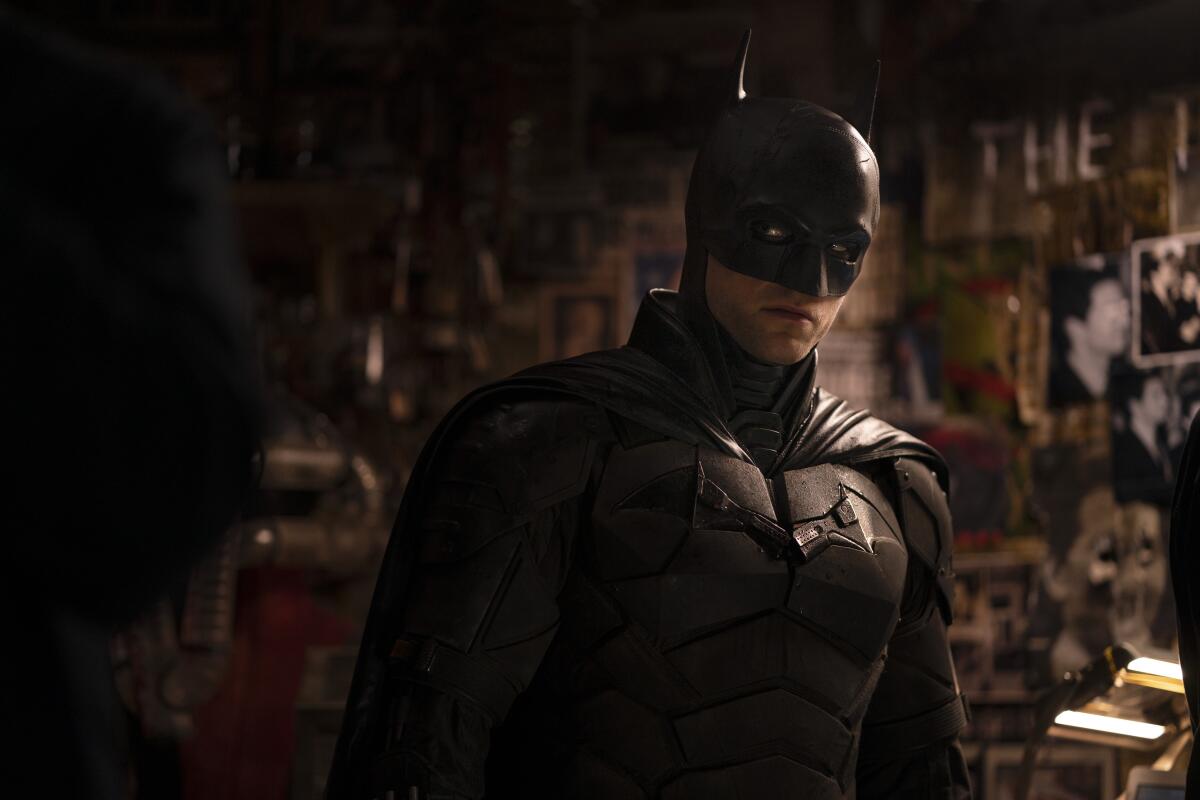
Several times while watching Matt Reeves and Robert Pattinson’s take on the Caped Crusader, I thought, “This is the Batman movie I’ve waited for.”
Yes, the Christopher Nolan trilogy was superbly executed, and as good as Paul Dano’s Riddler is here, Heath Ledger’s Joker is the most indelible supervillain. But the filmmaking in “The Batman,” now streaming on HBO Max, is superb — pay special attention to the cinematography and score — and produces the grittiest, most immediate and character-driven Bat-movie.
That’s not just because it’s the only one to present Bats in my favorite guise, the “Dark Knight Detective” — the film is an actual noir) — but also because it’s the only one to take Bruce Wayne’s childhood trauma seriously. It wrestles with the emotional damage that led an 8-year-old who saw his parents murdered to grow up to dress as a monster and physically punish criminals. It’s something comic god Frank Miller understood in his “Dark Knight Returns” and “Batman: Year One” cycles but no movie until now has confronted. The action is street-level; it’s violence with emotional impact.
That’s also why we get Emo Bruce here, as opposed to Billionaire Playboy Bruce. I’m hoping the latter shows up subsequently as a kind of mole, a useful idiot gathering information for the Dark Knight, because Reeves and Pattinson seem to get an essential truth the others didn’t: Batman isn’t the mask; Bruce Wayne is. —Michael Ordoña
Guest spot
A weekly chat with actors, writers, directors and more about what they’re working on — and what they’re watching
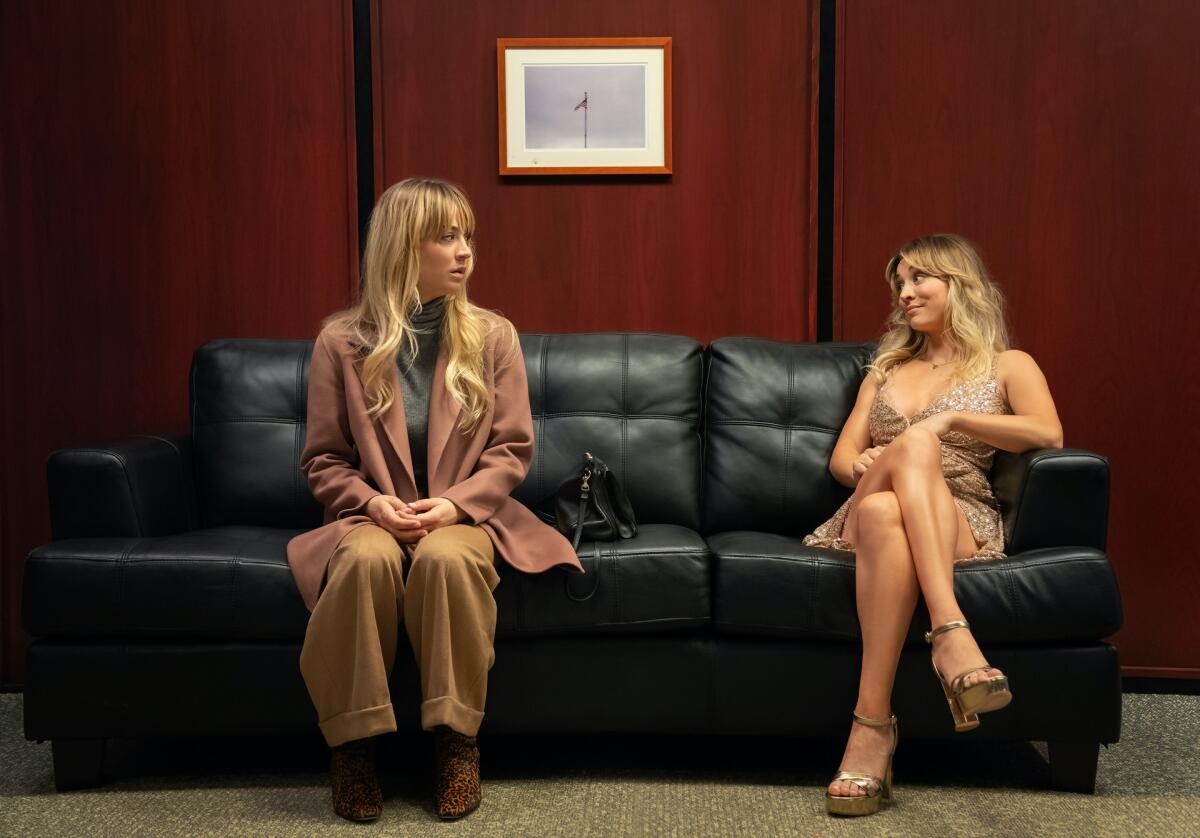
When “The Flight Attendant” (HBO Max) debuted two years ago, Kaley Cuoco introduced viewers to Cassie Bowden, an alcoholic stewardess who woke up next to a bloody corpse and had no idea how she got there. Season 2, which dropped its first two episodes Thursday, puts our newly sober protagonist in a new city, with a new job and facing a new presence in her “mind palace” — herself. Creator and co-showrunner Steve Yockey stopped by Screen Gab to talk about the espionage comedy’s biggest changes and what he’s most excited to watch. —Ashley Lee
“Flight Attendant” was initially a limited series. How did you approach Season 2?
I honestly expected 12 people to watch this very niche show, so the response from the audience was overwhelming. The plan had always been to treat those first eight episodes like a limited series, and any additional season would be like a new adventure. Even before figuring out the mystery of Season 2, our very first conversation was identifying Cassie’s emotional journey.
And what is that emotional journey?
We landed on a theme of self-acceptance: in Season 1; we left her in a hopeful place, with one day of sobriety under her belt. Sobriety is a journey, and it’s not always a comfortable one, so we wanted to explore what that would be for Cassie, who’s only just starting to accept parts of herself. When Season 2 begins, she’s made all these life changes that you’re not supposed to do in your first year of sobriety: She did a huge move to Los Angeles, she started dating someone who’s also in the program, she took on a new job as a CIA asset. She’s so anxious to prove to herself and everybody around her that she’s good.
The action jumps inside Cassie’s mind, where she’s now talking to herself, in a way. Where did that idea come from?
Natalie Chaidez, who joined us as my co-showrunner, had the idea to illustrate Cassie’s struggle with self-acceptance. They’re all these different versions of how she sees herself, some of whom we saw in Season 1: “gold dress Cassie” is this party girl who’s having fun and drinking every night; “black sweater Cassie” is dour and fatalistic; “future perfect Cassie” is if she had made all the right life choices. It was technically more difficult than we imagined in terms of the amount of time it takes to film. But Kaley is the most competitive person on the planet, so as soon as she realized it was a challenge and not just a chore, she lit it up in terms of tackling the technical aspects of acting against yourself.
What are you excited about in television right now?
I’m champing at the bit for “Russian Doll” [Netflix]. When it first came out, I consumed it in an afternoon and I was like, “Why did you watch it all of it so fast?”
What is something you watch over and over again?
I like to revisit the movie “Clue” [Showtime, VOD]. It’s brilliantly constructed, with these comedians who just land stuff over and over, and the script doesn’t let up. I was a kid and we had a General Cinema near my house, and it was such a big deal that it was playing in multiple theaters because it was barely the age of the summer blockbuster.
Break down
Times staffers chew on the pop culture of the moment — love it, hate it or somewhere in between.
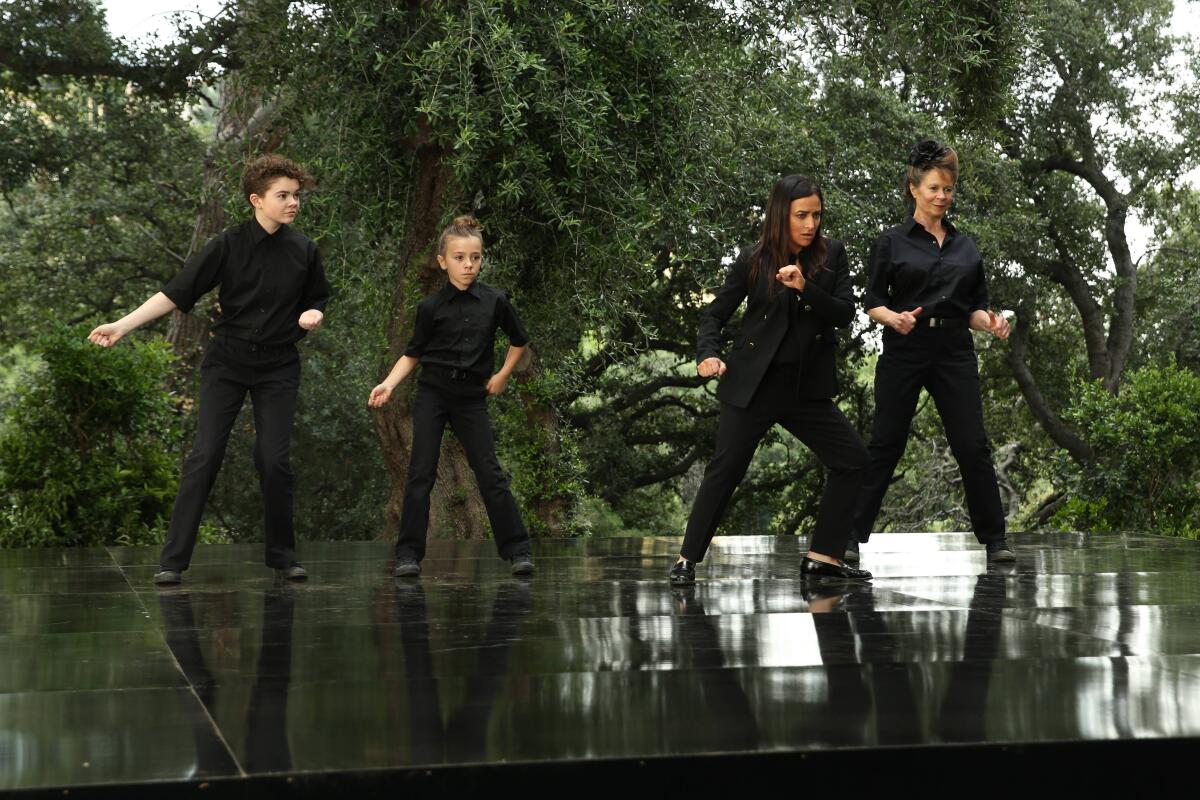
If “black-ish,” the long-running ABC sitcom that concluded its run this week, mastered the special episode, Pamela Adlon’s impeccably crafted “Better Things” (FX, Hulu) managed the same feat for the set piece. Armed with its creator-star’s artful eye and theatrical verve, the series, which comes to an end on Monday, has spent five seasons conjuring up sequences so astonishing it should make other comedies blush. It’s only fitting, then, to say farewell to a series whose animating spirit is gratitude to offer thanks for keeping my jaw on the floor all these years. Here are my five favorite:
The opening sequence of “Only Women Bleed” (Season 1, Episode 10): The nearly six-minute, almost-one-take sequence that opens the Season 1 finale, set to Laurie Anderson’s “O Superman” — “And when force is gone, there’s always Mom. Hi Mom!” — exemplifies the series’ canny use of high style to explore oft-overlooked subjects. In this case, it’s actor and single mom Sam Fox’s (Adlon) chaotic morning routine as she juggles a faux-sick daughter, Duke (Olivia Edward); her needy mother, Phil (Celia Imrie); two other children, Frankie (Hannah Riley) and Max (Mikey Madison); her housekeeper; her accountant; and text messages from a beau. I’m exhausted just summarizing it.
The dance number in “Graduation” (Season 2, Episode 10): “Better Things” is unafraid to walk the line between realism and surrealism, and the family’s high-school graduation gift to Max is a perfect example. The scene, set atop a glassy black stage that reflects the surrounding glade of trees, proceeds by the dream logic of a Busby Berkeley number: Clad in matching black button-downs, Sam, Phil, Duke and Frankie perform a gorgeous, wordless modern dance to Christine and the Queens’ “Tilted,” sprinkled with Max’s expressions of wide-eyed wonder. And ours too.
The piano bar singalong in “The Unknown” (Season 3, Episode 9): “The Unknown” lands Sam in New York for the live-read of a Broadway hopeful and “Better Things” with a partner that will continue to pay dividends: the musical. As Sam negotiates an attraction to her therapist (Matthew Broderick), the series marshals an impressive array of voices to perform Lerner and Loewe’s classic ballad “On the Street Where You Live,” and it’s by enmeshing the main plot with “My Fair Lady” that the series reaches new heights. Her sullen face now a faint smile, Sam returns to the action just in time for Norm Lewis’s grand finale — seven note-perfect lyrics that never fail to bring me to tears.
The wedding performance in “New Orleans” (Season 4, Episode 6): Technically speaking, it’s not from a musical at all — it’s from Tom Waits’ 1973 album, “Closing Time” — but Randy Rainbow’s longing rendition of “Martha,” delivered to his husband on the occasion of their wedding, is run through with the theater’s heightened emotion. And in an episode marked by cabaret acts, brass bands at Antoine’s, second lines on Royal Street, jazz at Preservation Hall, even the mellifluous cursing of NOLA cabbies, this “Martha” doubles as an emblem of what may be the series’ finest hour, an episode so acutely felt and hyperbolically alive it’s liable to make any New Orleanian homesick.
Duke’s vision in “England” (Season 5, Episode 9): As befits a visit to Sam’s ancestral homeland in the series’ penultimate episode, “England” is a stunner, culminating in Phil’s sparkling performance of the homesick ballad “Now Is the Hour.” But the sequence that best condenses the cinematic vision of “Better Things” comes earlier, as Duke stands before a rainbow over the Thames and envisions her grandmother as a child, marching toward the horizon with her brother, holding red balloons. At first, it registers as a premonition of Phil’s death — until Sam appears and, sparking a smile on Duke’s forlorn face, grasps her mother’s hand. It’s the sort of meditative, expressionistic moment few comedies would attempt, much less pull off, and yet it feels like a thesis statement for the series entire: Three generations of Fox women, always at the ready to bring each other back to life. —Matt Brennan
What’s next
The TV shows and streaming movies to keep an eye on in the coming week
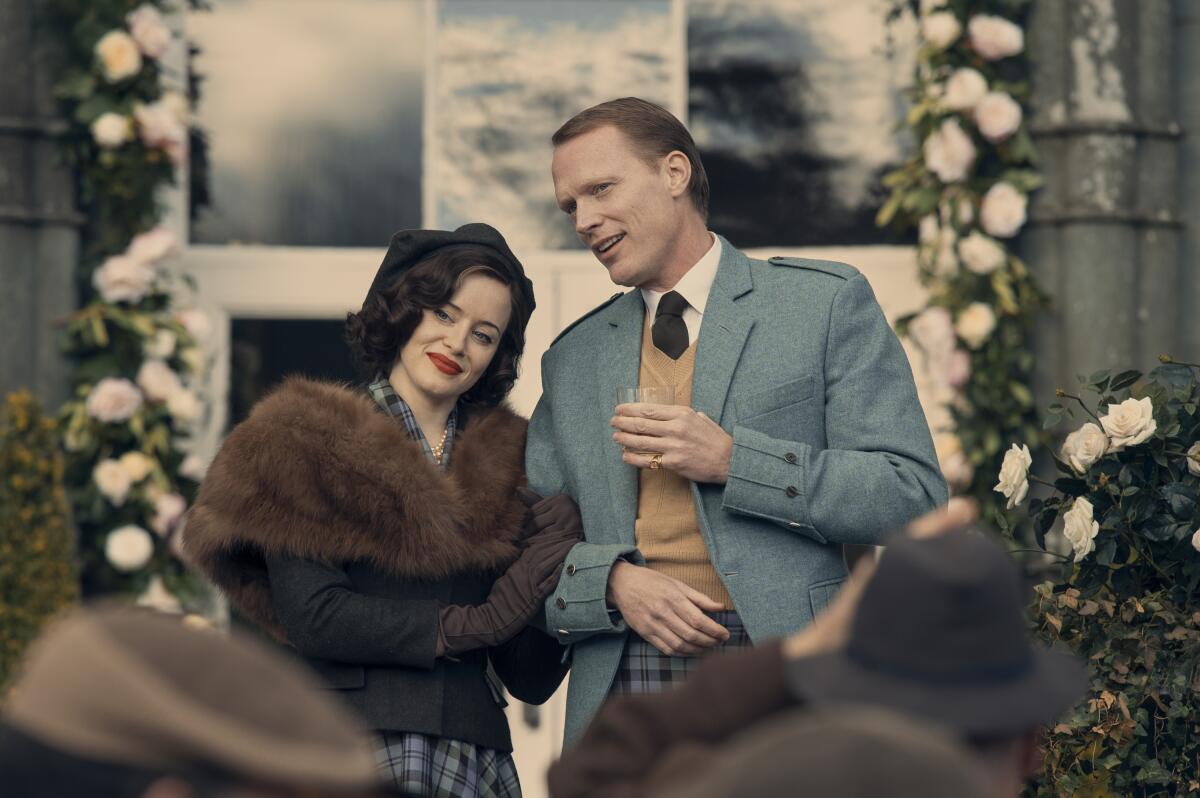
Fri., Apr. 22
“They Call Me Magic” (Apple TV+): You get a Lakers series! You get a Lakers series! Everybody gets a Lakers series!
“A Very British Scandal” (Amazon Prime Video): The follow-up to “A Very English Scandal” (and not to be confused with Netflix’s very British “Anatomy of a Scandal”) shifts to a new decade, the 1960s, to dramatize the tabloid-ready divorce of the Duke and Duchess of Argyll (Paul Bettany and Claire Foy).
Sun., Apr. 24
“Barry” (HBO): It has been so long since Season 2 of “Barry” concluded that no one remembers where Bill Hader’s hitman comedy left off. They could really take it anywhere at this point.
“Gaslit” (Starz): Julia Roberts stars as Martha Mitchell — with Sean Penn made up as an uncanny version of her husband, Atty. Gen. John Mitchell — in this “completely enjoyable” Watergate-adjacent tale from Robbie Pickering.
“The Man Who Fell to Earth” (Showtime): The latest miniseries inspired by a Walter Tevis novel (which also spawned the 1976 David Bowie film) stars Chiwetel Ejiofor as an alien and Naomie Harris as a scientist who allies with him.
“Navalny” (CNN): The “sensationally gripping” documentary about Russian dissident (and poisoning victim) Alexei Navalny that took Sundance by storm even before Vladimir Putin invaded Ukraine receives a timely commercial-free airing on CNN.
Mon., Apr. 25
“We Own This City” (HBO): David Simon returns (to HBO, to Baltimore) for a six-part miniseries about a corrupt division of the city’s police department, with Jon Bernthal in the lead role.
Wed., Apr. 27
“The Survivor” (HBO): Based on a true story, this Toronto premiere, directed by Barry Levinson, stars Ben Foster as Auschwitz survivor and boxer Harry Haft.
Thurs., Apr. 28
“The Offer” (Paramount+): The making of “The Godfather,” from the studio that brought you ... “The Godfather.” Talk about a cinematic universe!
“Under the Banner of Heaven” (FX, Hulu): Oscar nominee Andrew Garfield moves from musical comedy to murder and Mormons in this 1980s-set true crime drama, adapted by Dustin Lance Black (“Milk”) from the book by Jon Krakauer.
The biggest entertainment stories
Get our big stories about Hollywood, film, television, music, arts, culture and more right in your inbox as soon as they publish.
You may occasionally receive promotional content from the Los Angeles Times.



